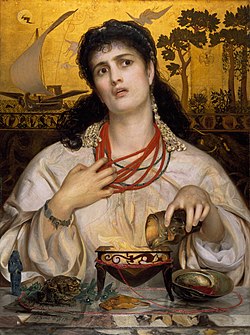Medea (Sandys painting)
| Medea | |
|---|---|
 | |
| Artist | Frederick Sandys |
| Year | 1868 |
| Medium | Oil on canvas |
| Dimensions | 61.2 cm × 45.6 cm (24.1 in × 18.0 in) |
| Location | Birmingham Museum & Art Gallery, Birmingham |
Medea is an 1868 oil painting on canvas by the Pre-Raphaelite painter Frederick Sandys. The painting was submitted to the Royal Academy of Arts for display in the Summer Exhibition of 1868 but it was rejected – most likely for internal politics and jealousies rather than artistic reasons.[1] The picture was accepted the following year and reviewed very favourably by The Times, which commented pointedly on its previous failure to win a place.[2]
Medea was modelled on Keomi Gray, a Romani woman whom Sandys had met in Norwich, England, and taken back to London to sit for many of his paintings.[3] According to a contemporary critic it shows the enchantress Medea "...in the act of incantation, the baleful light of her chafing-dish playing in the folds of her robe, and making the pale cheeks look paler, and the ashy lips more ashy, and kindling the array of foul ingredients and witch's properties that surround her tripod - foul toads and strange roots, and images of strange gods, and quaint shells filled with evil compounds."[4]
In 1911 the picture was among paintings representative of the best British art sent to Italy for the international exhibition at Rome held in honour of the jubilee of the Kingdom of Italy.[5]
References[]
- ^ "Medea by Anthony Frederick Sandys". Victorian Art in Britain. Archived from the original on 2008-06-26. Retrieved 2011-06-15.
- ^ "The Times". 1 May 1869: 12 "...If such a picture could be classed among the "doubtfuls" who can hereafter treat that fate as a verdict of inferiority?".
{{cite journal}}: Cite journal requires|journal=(help) - ^ Sandys' Love Life Archived 2011-07-24 at the Wayback Machine in Frederick Sandys & the Pre-Raphaelites at the Norfolk Museums and Archaeology service.
- ^ "The Times". 1 May 1869: 12.
{{cite journal}}: Cite journal requires|journal=(help) - ^ "British Art for the Rome Exhibition". The Times: 7. 20 March 1911.
- 1868 paintings
- Paintings depicting Greek myths
- Collections of Birmingham Museum and Art Gallery
- Witches in art
- Ships in art
- Paintings by Frederick Sandys
- Frogs in art
- Works about Medea
- Paintings of fictional women
- 19th-century painting stubs